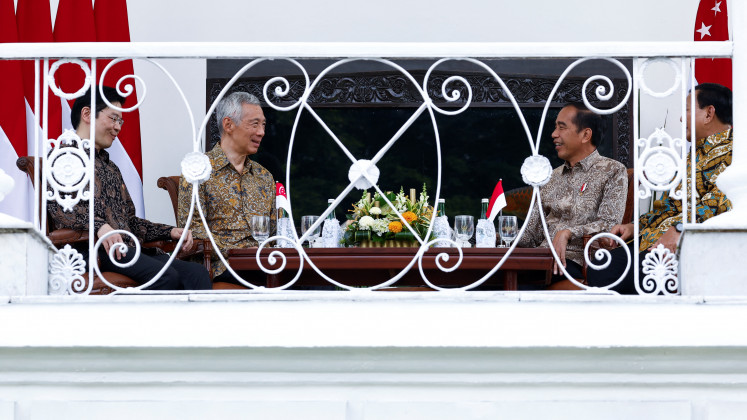Budget cuts jeopardize Indonesia’s renewable energy plans
The government has decided to put the brakes on efforts to push the use of renewable energy in electricity procurement as it plans hefty cuts to state spending in the energy sector
Change Size

T
he government has decided to put the brakes on efforts to push the use of renewable energy in electricity procurement as it plans hefty cuts to state spending in the energy sector.
Last week, newly appointed Finance Minister Sri Mulyani said the government was preparing a series of budget cuts across various ministries and government institutions in an effort to salvage an expected tax shortfall this year that could reach Rp 219 trillion (US$16.7 billion) amid global economic weakness.
In response to the call, the Energy and Mineral Resources Ministry announced on Friday that it would slash Rp 900 billion from its budget this year, with the biggest share, accounting for around a third of the proposed figure, to be taken from its new and renewable energy (EBTKE) directorate general.
EBTKE director general Rida Mulyana said his department would be left with Rp 1.7 trillion from the Rp 2.1 trillion originally stipulated in the 2016 revised state budget.
However, Rida assured that priority programs, such as the project to procure electricity for 12,659 villages in the country’s remote regions, would continue to progress.
“We will return Rp 382 billion to the state’s coffers because we need to postpone a number of projects so that other strategic projects, such as the Indonesia Terang [Bright Indonesia] project to procure electricity for remote areas, can continue,” he said at a press briefing.
The ministry’s projects to be postponed include the construction of a micro-hydro power plant in Papua, a waste-to-energy plant on the resort island of Bali and the installation of rooftop solar panels at airports in Bali as well as in Medan, North Sumatra, and Makassar, South Sulawesi.
The ministry, Rida added, would also slash the number of work trips by its civil servants to trim budget spending.
The budget cut comes at a time when things have been looking up for new and renewable energy development in the country, which has been lagging despite vast natural potential.
Investment in new and renewable energy amounted to $870 million in the first half of this year, 63.5 percent of the total target of $1.37 billion. The biggest chunk of that investment at $560 million went into geothermal energy.
By the end of the first semester, the total national electricity capacity from geothermal energy reached 1,493 megawatt (MW) due to the installment of four new power plants in North Sumatra, Lampung and West Java.
The government aims for the country to eventually generate 7,156 MW of electricity from geothermal energy, which would make it the biggest geothermal energy producer in the world.
Various projects for solar power plants producing 15.3 MW of electricity and micro-hydro power plants capable of generating 6.2 MW are also under construction or being auctioned
Non-tax revenue from new and renewable energy resources reached Rp 283.25 billion during the first six months of the year, less than half of the full-year target of Rp 630 billion. The revenues collected so far have been solely from geothermal energy projects.
Although it is environmentally friendly, electricity produced from renewable energy sources is usually sold at a higher price compared to that produced by non-renewable energy to cover the hefty amount of investment.
The new and renewable energy directorate general has recently received approval from the Finance Ministry to get a Rp 1.2 trillion subsidy next year to plug any gaps between the price of electricity from renewable sources and conventional sources that state-owned electricity company PLN cannot cover from its own funds.
However, Institute for Essential Services Reform (IESR) executive director Fabby Tumiwa remains unimpressed. The major budget cut at the new and renewable energy directorate general, he said, suggested that the sector was still under-utilized in comparison with more traditional energy sources.
“The budget cut in new and renewable energy development and conservation shows that Energy and Mineral Resources Minister Arcandra Tahar does not stand up for and remains neglectful of the sector,” he said in a press release.
Fabby explained that the budget cut may still hamper priority projects like Indonesia Terang and goes against the government’s ambitious plan to reach a national electrification ratio of 97.35 percent by 2019.
“This budget cut may give a negative signal to business players, investors and development partners about the government’s commitment to develop and conserve new and renewable energy,” he said.
----------------
To receive comprehensive and earlier access to The Jakarta Post print edition, please subscribe to our epaper through iOS' iTunes, Android's Google Play, Blackberry World or Microsoft's Windows Store. Subscription includes free daily editions of The Nation, The Star Malaysia, the Philippine Daily Inquirer and Asia News.
For print subscription, please contact our call center at (+6221) 5360014 or subscription@thejakartapost.com









